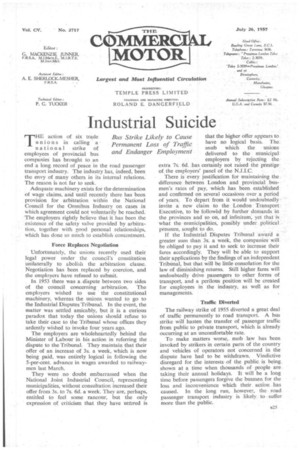Industrial Suicide
Page 33

If you've noticed an error in this article please click here to report it so we can fix it.
THE action of six trade U nions in calling a• national strike of employees of provincial bus companies has brought to an end a long record of peace in the road passenger transport industry. The industry has, indeed, been the envy of many others in its internal relations. The reason is not far to seek.
Adequate machinery exists for the determination of wage claims, and until recently there has been provision for arbitration within the National Council for the Omnibus Industry on cases in which agreement could not voluntarily be reached. The employers rightly believe that it has been the existence of the safety valve provided by arbitration, together with good personal relationships, which has done so much to establish contentment.
Force Replaces Negotiation Unfortunately, the unions recently used their legal power under the council's constitution unilaterally to abolish the arbitration clause. Negotiation has been replaced by coercion, and the employers have refused to submit.
In 1953 there was a dispute between two sides of the council concerning arbitration. The employers wished to use the constitutional machinery, whereas the unions wanted to go to the Industrial Disputes Tribunal. In the event, the matter was settled amicably, but it is a curious paradox that today the unions should refuse to take their case to the Tribunal whose offices they ardently wished to invoke four years ago.
The employers are wholeheartedly behind the Minister of Labour in his action in referring the dispute to the Tribunal. They maintain that their offer of an increase of 3s. a week, which is now being paid, was entirely logical in following the 5-per-cent. advance in wages awarded to railwaymen last March.
They were no doubt embarrassed when the National Joint Industrial Council, representing municipalities, without consultation increased their offer from 3s. to 7s_ 6d. a week. They are, perhaps, entitled to feel some rancour, but the only expression of criticism that they have utilered is that the higher offer appears to have no logical basis. The, snub which the unions delivered to the municipal employers by rejecting the extra 7s. 6d. has certainly not raised the prestige' of the employers' panel of the N.J.I.C.
There is every justification for maintaining the difference between London and provincial busmen's rates of pay, which has been established and confirmed on several occasions over a period of years. To depart from it would undoubtedly • invite a new claim to the London Transport Executive, to be followW by further demands in the provinces and so on, ad infinitum, yet that is what the municipalities, possibly under political • pressure, sought to do.
If the Industrial Disputes Tribunal award a greater sum than 3s. a week, the companies will be obliged to pay it and to seek to increase their fares accordingly. They will be able to support their applications by the findings of an independent Tribunal, but that will be little consolation for the law of diminishing returns. Still higher fares will undoubtedly drive passengers to other forms of transport, and a perilous position will be created for employees in the industry, as well as for managements.
Traffic Diverted The railway strike of 1955 diverted a great deal of traffic permanently to road transport. A bus strike will hasten the transfer of passenger traffic from public to private transport, which is already occurring at an uncomfortable rate.
To make matters worse, mob law has been invoked by strikers in certain parts of the country and vehicles of operators not concerned in the dispute have had to be withdrawn. Vindictive disregard for the interests of the public is being shown at a time when thousands of people are taking their annual holidays. It will be a long time before passengers forgive the busmen for the loss and inconvenience which their action has caused. In the long run, however, the road passenger transport industry is likely to suffer more than the public.








































































































